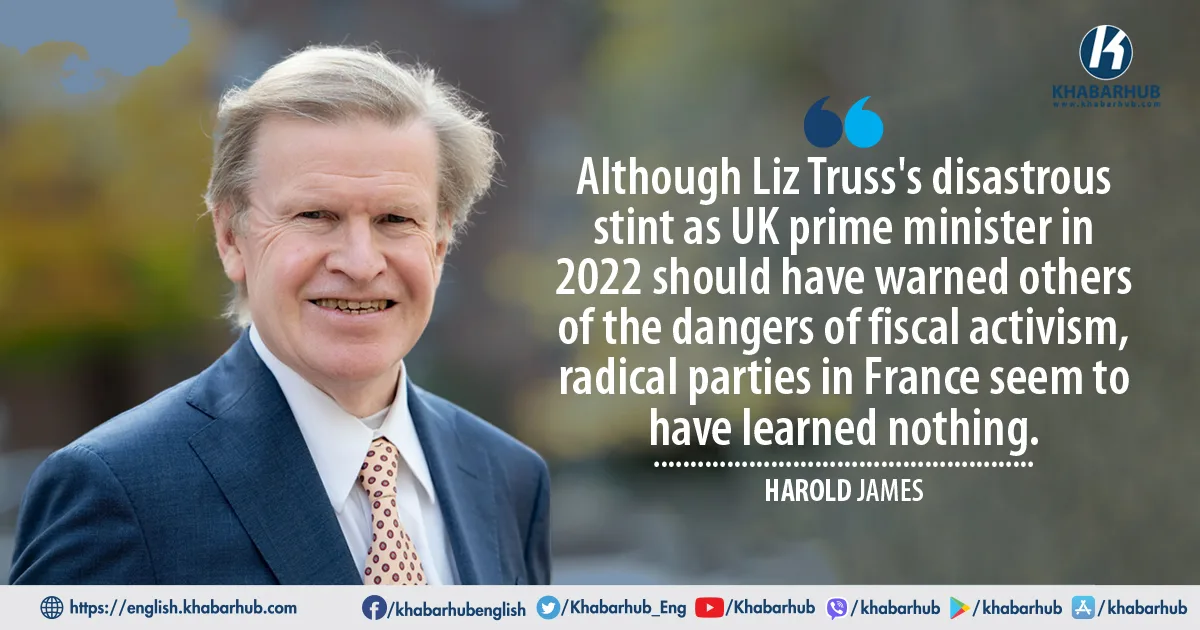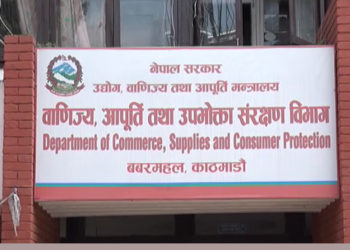“Trussing” is an old English verb with various connotations. It can mean putting in beams to support a building or bridge, or tying up a turkey before it is roasted.
But since Liz Truss’s brief, disastrous tenure as prime minister of the United Kingdom in the fall of 2022, it has also come to refer to a fiscally strained government making wildly unrealistic promises that will end in tears.
No longer is trussing always stabilizing; sometimes, it means the opposite.
There are many momentous elections this year, and all are overshadowed by fears of trussing.
Truss’s own government fell apart after its £45 billion ($57 billion) of unfunded tax cuts created a financial panic that forced the Bank of England to step in to buy government securities.
The BOE made clear that its support would last until October 14. On that day, the Chancellor of the Exchequer, Kwasi Kwarteng, had to resign, leaving Truss to find someone who could work with rather than against the markets. But her government was over.
Fear of trussing is most immediately visible in France, where President Emmanuel Macron shocked everyone by dissolving the National Assembly in the wake of his party’s disastrous performance in the European Parliament election.
He seems to want to show that there is no alternative to his policy.
But if the far-right National Rally party were to form a government, which looks increasingly possible, after it won around 34% of the first-round vote, and follow through on its past big spending promises, it would immediately trigger a financial meltdown.
The mere announcement of a snap election was enough to cause a spike in bond yields, opening the gap between the prices of French and German securities.
Macron’s maneuver is best understood as a way of taming the right, or showing that its promises are rhetorical hot air.
The ECB would also face a dilemma. Either it could start making massive asset purchases and risk setting a dangerous precedent, or it could refuse and risk being labeled as an agent of German oppressiveness.
But his decision has some terrifying historical precedents from the interwar period, when many European democracies failed. Consider Germany.
By the winter of 1932, two separate parliamentary elections had failed to produce an outcome that could lead to a government with a workable majority.
The elections had brought big gains for the Nazi party (on the right) and for the communists (on the left), but in the second election, the Nazis did worse than expected, even as they retained the largest number of parliamentary seats.
Thus, at the end of January 1933, Franz von Papen, who had been a chancellor without a majority in the second half of 1932, decided to place a risky bet: He would convince the senile president, Paul von Hindenburg, to appoint Adolf Hitler as the head of a coalition government, thus allowing the Nazi leader to demonstrate his ineffectiveness.
As Papen exuberantly put it, Hitler would find himself “boxed” in.
Of course, things turned out quite differently, and Papen looked like a fool (and eventually like a war criminal).
He had made his bet just as the German economy was beginning a slow recovery from the Great Depression, when the state that Hitler would control could maneuver without much constraint from international capital (which had been broken by the financial market collapse) or the central bank (which had been subordinated to the government).
In other words, Hitler faced none of the external forces that define trussing episodes.
In this summer’s French election, the alternative to National Rally is the New Popular Front (NPF), whose name consciously evokes the mid-1930s mobilization of the left under Léon Blum’s Front Populaire.
Members of Blum’s communist-socialist bloc believed that the French central bank and big commercial banks had brought down the government with a “wall of money” (mur d’argent) in the late 1920s.
(When the BOE brought down a British Labour government in 1931, their suspicions about the role of capital in politics were confirmed.)
France today faces a double dilemma. The anti-Macron coalitions of both the left and the right will want to pursue fiscal activism – meaning more spending and, in the case of the NPF, big tax increases – which would immediately trigger a bond sell-off.
Limitations on government action often lead angry citizens to demand more radical and destabilizing options, and that can lead countries to turn in on themselves and abandon international commitments, financial stability be damned.
Yet both also would be heavily dependent on the European Central Bank.
The ECB would also face a dilemma. Either it could start making massive asset purchases and risk setting a dangerous precedent, or it could refuse and risk being labeled as an agent of German oppressiveness.
Trussing thus highlights the ways that central banks limit government action and impose conditions compatible with continued access to international markets.
It is no accident that both the current French alternatives are intensely nationalistic.
But there are always alternatives. In 1983, when the French government of the time was facing disaster, some on the left imagined a turn to autarky, or a return to the radicalism of the 1930s.
They were sidelined, however, and Jacques Delors, then the finance minister, led France back to Europe and political centrism.
The oddity of the current situation is reflected in the marked difference between the panic and nervousness of the French campaign and the almost eerie calm of the nearly simultaneous British election.
The UK Labour Party is all but assured a decisive victory because it has fully internalized the lessons of previous trussings.
Its policy promises rest on a foundation of fiscal responsibility and credibility.
Notwithstanding the historical lessons, trussing politicians will continue to demonize central banks.
That may well happen in France this year, and it is likely to happen in the United States if Donald Trump wins the presidential election this November.
Limitations on government action often lead angry citizens to demand more radical and destabilizing options, and that can lead countries to turn in on themselves and abandon international commitments, financial stability be damned.
(Harold James is Professor of History and International Affairs at Princeton University)
Copyright: Project Syndicate









Comment